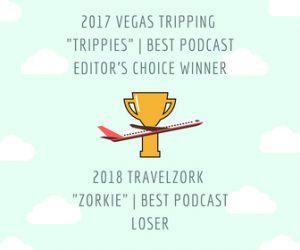Vegas is ripe for interesting content. It’s a visually compelling city and the casinos are a treasure trove of customers falling victim to logical fallacies. Gambling, dining, and sightseeing, it’s a content creator’s dream.
So it’s no wonder why as YouTube matured and visual social platforms like Instagram and TikTok grew a massive user base Vegas became a hotbed of influencers and influencer wannabes. Some, as they grew in popularity, have even moved, calling Vegas home so it’s easier to keep churning out content consistently.
As popular vloggers and influencers descended upon Vegas and their subscriber numbers proliferated and a veneer of professionalism glazed their channels, resorts, smartly, started to take notice. Big accounts are now routinely offered hotel stays. Typically, these offers come with no strings attached. It’s rare for a resort or restaurant to put pressure on an influencer to leave a review, let alone a positive one. It’s a savvy, soft marketing approach. They hope for favorable coverage. But it’s not a requirement.
Yet, as these offers rolled in for notable Vegas personalities, there persisted, and still does, an odd naivety about endorsements and disclosers.
There are strict regulatory requirements in other industries. For example, physicians giving presentations at conferences and seminars are required to include a slide at the beginning of their presentations noting any material conflicts. The social media influencer industry is under far less regulatory scrutiny than the world of medicine. Even so, the FTC does offer guidelines on when and how influencers should disclose a relationship to a brand mentioned in their post or video:
Disclose when you have any financial, employment, personal, or family relationship with a brand.
- Financial relationships aren’t limited to money. Disclose the relationship if you got anything of value to mention a product.
- If a brand gives you free or discounted products or other perks and then you mention one of its products, make a disclosure even if you weren’t asked to mention that product.
- Don’t assume your followers already know about your brand relationships.
- Make disclosures even if you think your evaluations are unbiased.
And even if you don’t want the FTC to come calling, as rare as it may be, it’s just proper to give your followers a clear picture of any connection you have to brands you discuss.
My frustration reached a boiling point recently with Jennifer Gay, who goes by @VegasStarfish across Twitter, Instagram, and Tik Tok. Before I rehash my distaste for some of her posts, let me explain my standards for public grievances.
I know there are many in the Vegas content community who receive freebies or have material connections they don’t disclose. If I chose to fight every battle I’d lose what little sanity I have left. I don’t go after accounts with fewer followers than mine. If I think the person has little influence I tend to just ignore them. And if they seem to just be generally ignorant of best practices, I give them the benefit of the doubt. But occasionally, there are big accounts who, when presented with potential corrections or questions about bias, respond flippantly. Smugness and dismissiveness always get a second look from me.
Vegas Starfish’s posts have popped up on my feed occasionally. Hell, I’ve even complimented her work before. I found her F1 coverage lacking, and when she was corrected about a minor point, that the first practice session was not an actual race, she responded with the immaturity you’d expect from an Instagram user decades younger. I perused her posts and, as a copywriter by trade, I smelled a distinct PR aroma whenever she mentioned Lip Smacking Foodie Tours (LSFT), a popular and well-regarded restaurant tour agency.
As I found, which she admitted she wasn’t hiding, she has a relationship with the company. Posts on the LSFT Facebook page are copies of her own social media posts.
What an undisclosed coincidence pic.twitter.com/iieFZPFboX
— Adam Bauer (@BauerPauerHauer) November 18, 2023
You can read her multiple responses in the thread. In them, she claims that she is compliant with the FTC and her relationship is limited to being friends with the owner. But that doesn’t match up with numerous instances in which she talks about LSFT. For instance, in an interview with The Las Vegas Fill podcast, she uses the term “we” to discuss her work with LSFT and even says that, as they were branching out to new cities, “Lip Smacking Foodie Tours handles the food aspect of it, they sort of choose the restaurants we go to and the food that we eat and then I take care of like hotels and resorts and experiences and we create content that’s being featured on the Drew Barrymore show…” She’s also managed the LSFT social media pages. Even if her relationship with LSFT was limited to just being friends with the owner, her failure to disclose that in her multiple posts promoting the business would still violate the FTC guidelines, though, admittedly, it’s hardly egregious. But it appears she is downplaying that relationship based on prior interviews. Gay has yet to respond to questions regarding whether she gets free meals from LSFT.
Her relationship with LSFT matters, but the hypocrisy and denial have made this brouhaha exponentially more damning. She stated in a response to my original tweet that “for YEARS I have been fully partnered with Lip Smacking Foodie Tours.” Yet, in her Vegas vacation guide, which costs $10 and was updated in July 2023, she says “I am not partnered with ANY brand, and the places I recommend in this guide are my own opinions and based on the feedback I’ve received from others.” You’re welcome for the $10, Jennifer. In this guide in which she says she’s not partnered, she mentions LSFT 4 times as a suggestion and Finger Licking Foodie Tours once. Both have the same owner. Odd capitalization choices aside, her claims are inconsistent and misleading. LSFT may be a great company, but suggesting it multiple times in a guidebook without mention of an existing relationship reeks of conflict.
This problem, of course, isn’t limited to one person. Travel Ruby, a popular vlogger, recently detailed her Formula One experience, which included a stay at Wynn. In the video, she explored the casino and gave a room tour. A commenter asked how she was able to afford a stay at Wynn during F1, to which she replied, “The Wynn let us stay for free, but we weren’t obligated to film a video I’m sorry that wasn’t clear!”
There’s no way it would be clear because it was never mentioned. The FTC doesn’t require a quid pro quo. The FTC explicitly states, “If a brand gives you free or discounted products or other perks and then you mention one of its products, make a disclosure even if you weren’t asked to mention that product.” To Travel Ruby’s credit, she was polite and apologetic when asked about this potential bias. She even pinned a comment to clarify. But even to the FTC, that’s likely not meeting the minimum threshold for endorsement requirements.
These examples are just from the last two weeks. There are numerous cases of suspicious behavior and clear disclosure violations. It matters. The FTC explains it well: Telling your followers about these kinds of relationships is important because it helps keep your recommendations honest and truthful, and it allows people to weigh the value of your endorsements.
My rules for accepting freebies are simple. I just don’t do it. This doesn’t mean it’s the best approach. It’s not better than accepting some or all. It just makes it simple for me. I don’t have to pick and choose or worry about how I’m presenting material. I’d suggest other creators have their own set of rules and then have a plan for how they will consistently address it in each of their videos or posts.
Let’s be clear here: Not hiding and disclosing are not the same thing. Vegas creators, of all the communities across the internet, seem to be the least aware of disclosure requirements. I watch a lot of cooking and chef-related content on YouTube. I see sponsorships all the time. They’re notable, but not distracting. I even bought a pan based on a sponsorship. I love that pan. Influencer marketing works when done well.
The odd thing is that there is no shame in accepting something for free. You’ve proven you have a marketable brand that’s worth something. You’ve built something out of nothing and created value. You should be proud of yourself. Brands can leverage your audience and you can showcase something you ideally enjoy with little or no out-of-pocket cost. You both win. So I don’t understand the hesitation.
“Hey everyone, Wynn (not The Wynn) invited me to stay so I can show you what it’s like here during F1 weekend!” Not only is that inoffensive, but it sounds professional and even exciting. You can acknowledge the relationship, and then move on. We the audience can determine how genuine you are. We won’t have the Greco at our disposal, but let’s face it, few vloggers are good actors.
I can only speak for myself, but my admittedly extreme focus on this is to raise the quality of Vegas content. To ensure that the millions of people ravenous for Vegas content are getting quality, honest advice from Vegas media and personalities. I’m not trying to tear people down or ruin a brand. Though, if I were to have a rare moment of self-reflection, I could be less aggressive in my approach. I’ll do my best going forward.
Vegas content has never been more wide, but it’s painfully shallow. There’s a lack of curiosity. Too little focus on accuracy. And positivity is scarce as rage-baiting gets clicks. But when you add in deception, purposeful or not, it creates this swamp we all have to wade through to find those few voices who can capture the energy of the city in a meaningful, honest way.











Add comment